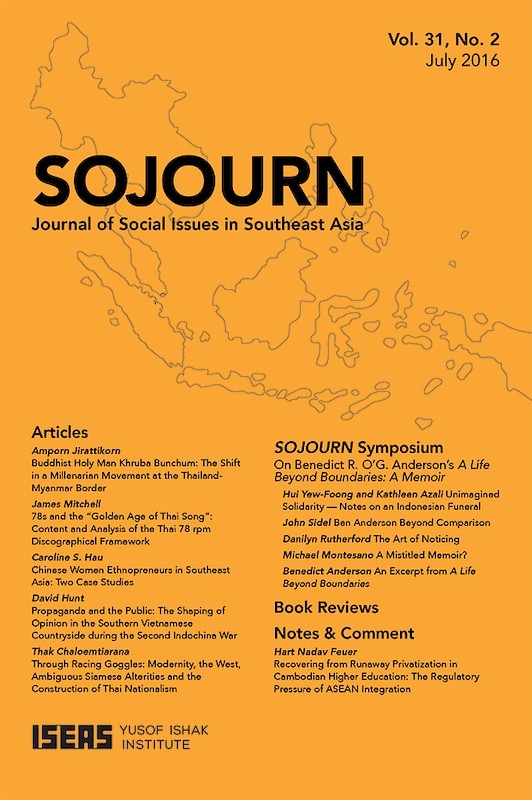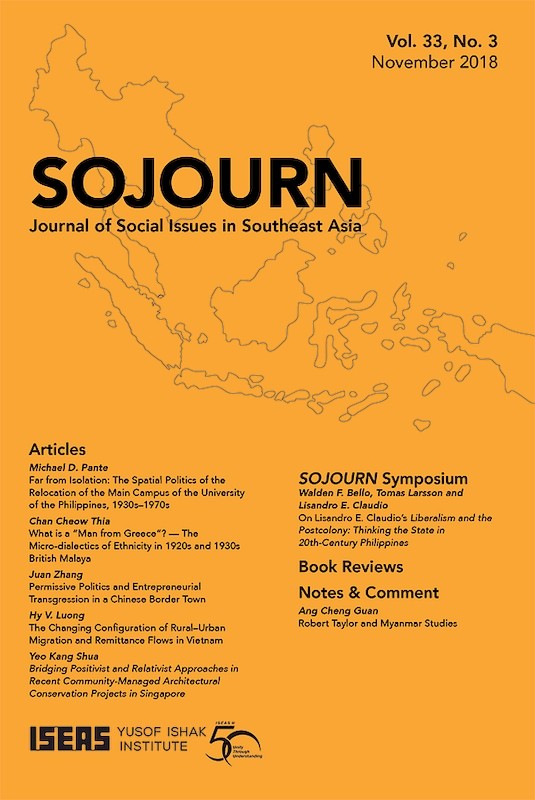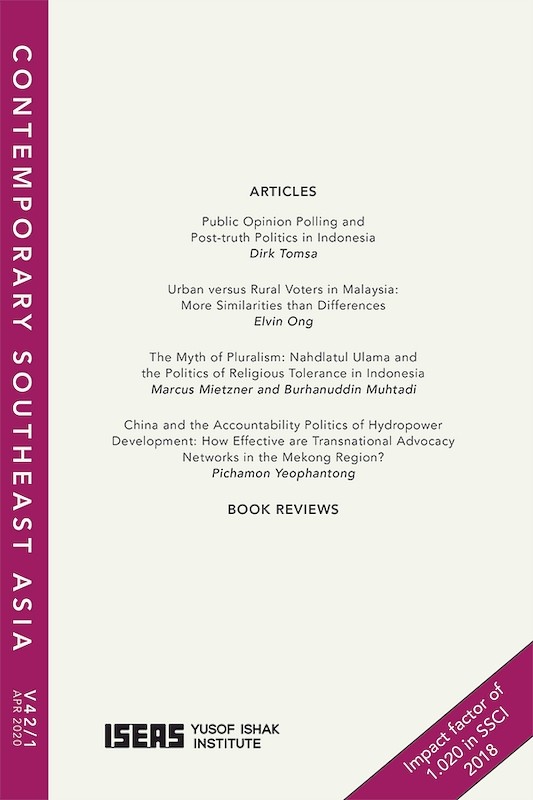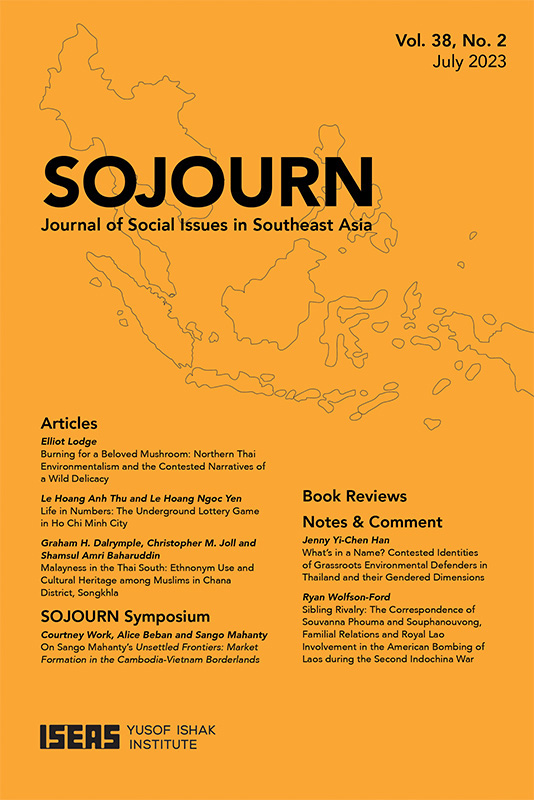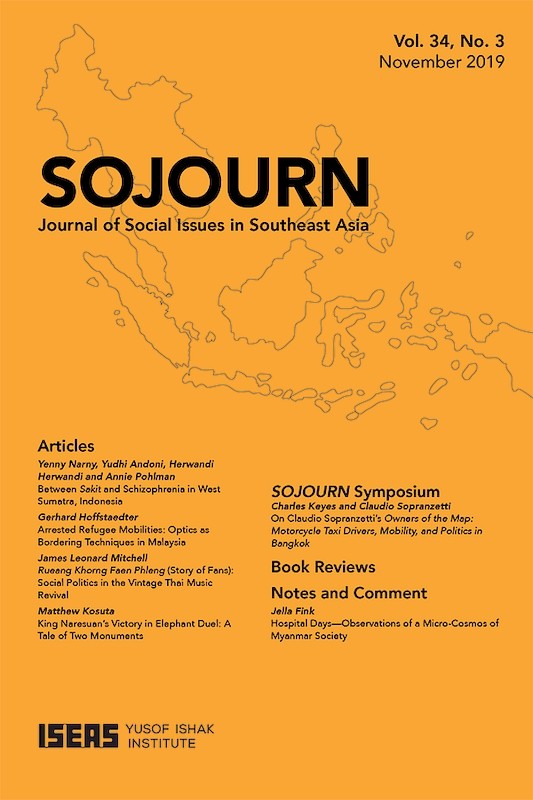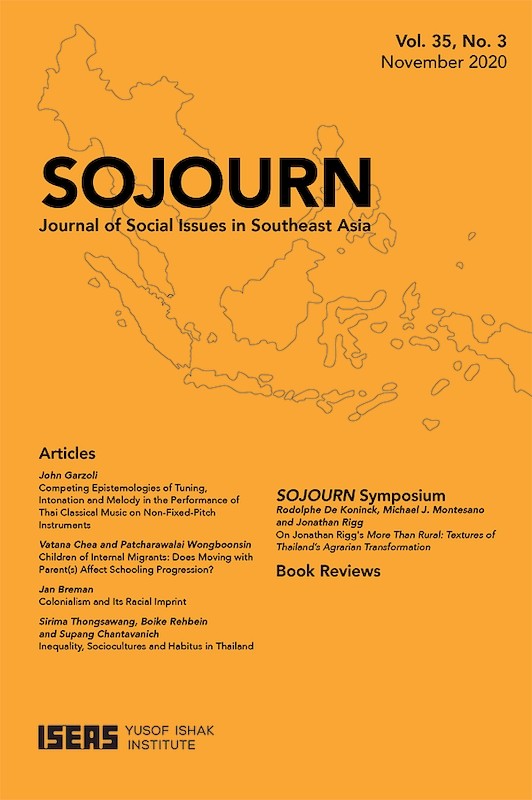SOJOURN: Journal of Social Issues in Southeast Asia Vol. 39/3 (November 2024)
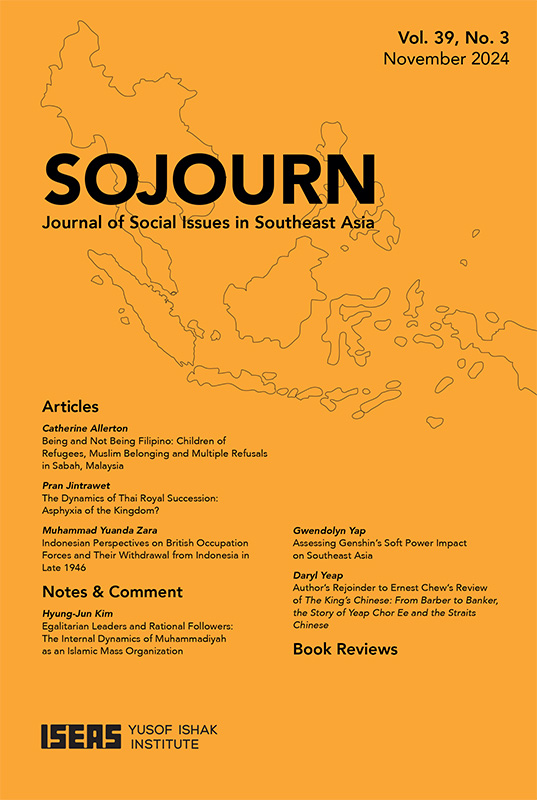
Date of publication:
November 2024
Publisher:
ISEAS – Yusof Ishak Institute
Number of pages:
167
Code:
SJ39/3
Soft Cover
ISSN: 02179520
Contents
-
SOJOURN: Journal of Social Issues in Southeast Asia Vol. 39/3 (November 2024)
[Whole Publication, ISSN: 17932858] -
Preliminary pages
- ARTICLES
-
Being and Not Being Filipino: Children of Refugees, Muslim Belonging and Multiple Refusals in Sabah, Malaysia, by Catherine Allerton, author see abstractThe experience of children of Muslim Filipinos in Sabah provides an intriguing case study for understanding “refugeeness” and children’s identities in protracted situations of displacement. For complex historical, political and social reasons, these children both are and are not Filipino. Their families assert a cultural citizenship across political borders, while Sabahans stigmatize Filipino and refugee identities. The children themselves foreground their identity as Muslim, allowing them to assert a form of place-belonging that is not recognized by many Sabahans. The article theorizes these assertions and denials through the concept of refusal, arguing that in this context refusal takes multiple, competing forms.
-
The Dynamics of Thai Royal Succession: Asphyxia of the Kingdom?, by Pran Jintrawet, author see abstractIn the twilight of the reign of King Bhumibol (r. 1946–2016), there was the mistaken belief that the heir to the throne could be changed despite the existence of a clear line of succession. This article argues that overlooking the custom of royal succession and the dynamic of the palace’s core contributed to this misunderstanding. During the fifth reign of the Chakri dynasty, this custom was reinterpreted and refined into a policy that became the Law of Succession in 1924 during the sixth reign. The law became an integral part of successive Thai constitutions following the 1932 revolution and has retained decision-making on the succession in the hands of the monarch, sidelining the parliament. Paying attention to the core of the palace could offer a nuanced understanding of the nature of royal succession and the foundation paved for later successions up to the present day. Although the reinterpreted custom remains a salient guideline for succession, it also bars any reform or change. This is the kind of asphyxia that the kingdom could be facing now.
-
Indonesian Perspectives on British Occupation Forces and Their Withdrawal from Indonesia in Late 1946, by Muhammad Yuanda Zara, author see abstractThis study explores the perspectives of Indonesian nationalists on the withdrawal of British forces from Indonesia (September–November 1946). By examining scarcely used Indonesian media, this study argues that the withdrawal was momentous for Indonesians. Indonesian nationalists criticized the British troops for violating Indonesian sovereignty, attacking Indonesian fighters and committing crimes against Indonesian civilians. When the British troops finally withdrew, Indonesian nationalists remembered the British occupation in terms of British atrocities, the contribution of Indonesians in helping the British disarm the Japanese and free prisoners of war, and the heroism of Indonesian fighters against the British.
- NOTES & COMMENT
-
Egalitarian Leaders and Rational Followers: The Internal Dynamics of Muhammadiyah as an Islamic Mass Organization, by Hyung-Jun Kim, author see abstractThis article explores the dynamics between leaders and followers in Indonesia’s mass Islamic movement Muhammadiyah by analysing how its leaders view the characteristics of followers, the position and role of leaders, and the nature of group cohesion. The findings suggest that Muhammadiyah leaders generally do not prioritize the development of a strong collective identity and group solidarity. Their approach is informed by a view of followers as rational actors and leaders primarily as conveyors of Islamic teachings, with a deliberate avoidance of forming deep emotional ties within the organization. These insights are crucial for grasping Muhammadiyah’s internal dynamics and evaluating the effectiveness of its collective endeavours.
-
Assessing Genshin’s Soft Power Impact on Southeast Asia, by Gwendolyn Yap, author see abstractThe global takeover of Genshin Impact, a video game released in 2020, has been lauded as a success for Chinese soft power by both Chinese and Western audiences. But while the game has been highly successful in Southeast Asia, spilling over from the gaming community into the commercial and cultural realms, little to no research has been conducted on the soft power impact of the game in the region. With growing interest in China’s rising power within the region, it is important to understand how effective Chinese cultural products are in influencing audiences in Southeast Asia. Based on a survey involving 264 respondents from Singapore, Malaysia and Indonesia, this research note will show, contrary to reports by Chinese and international media, that the soft power influence of Genshin Impact remains limited owing to existing sociocultural influences within Southeast Asia.
-
Author’s Rejoinder to Ernest Chew’s Review of The King’s Chinese: From Barber to Banker, the Story of Yeap Chor Ee and the Straits Chinese, by Daryl Yeap, author
- BOOK REVIEWS
-
BOOK REVIEW: Buried Histories: The Anticommunist Massacres of 1965–66 in Indonesia by John Roosa, by Vannessa Hearman, author
-
BOOK REVIEW: Warring Visions: Photography and Vietnam by Thy Phu, by Nicolas Lainez, author
-
BOOK REVIEW: Border Humanitarians: Gendered Order and Insecurity on the Thai-Burmese Frontier by Adam Saltsman, by Stephen Campbell, author
-
BOOK REVIEW: In Search of Justice in Thailand’s Deep South: Malay Muslim and Thai Buddhist Women’s Narratives edited by John Clifford Holt, by Amporn Marddent, author
-
BOOK REVIEW: Monetary Authorities: Capitalism and Decolonization in the American Colonial Philippines by Allan E.S. Lumba, by Michael J Montesano, author
-
BOOK REVIEW: Fleeting Agencies: A Social History of Indian Coolie Women in British Malaya by Arunima Datta, by Andrew C Willford, author
-
BOOK REVIEW: Divine Custody: A History of Singapore’s Oldest Teochew Temple by Yeo Kang Shua, by Simone Shu-Yeng Chung, author
-
BOOK REVIEW: Out of the Shadows of Angkor: Cambodian Poetry, Prose, and Performance through the Ages. Guest editors: Sharon May, Christophe Macquet, Trent Walker, Phina So and Rinith Taing. Series editor: Frank Stewart, by George Chigas, author

